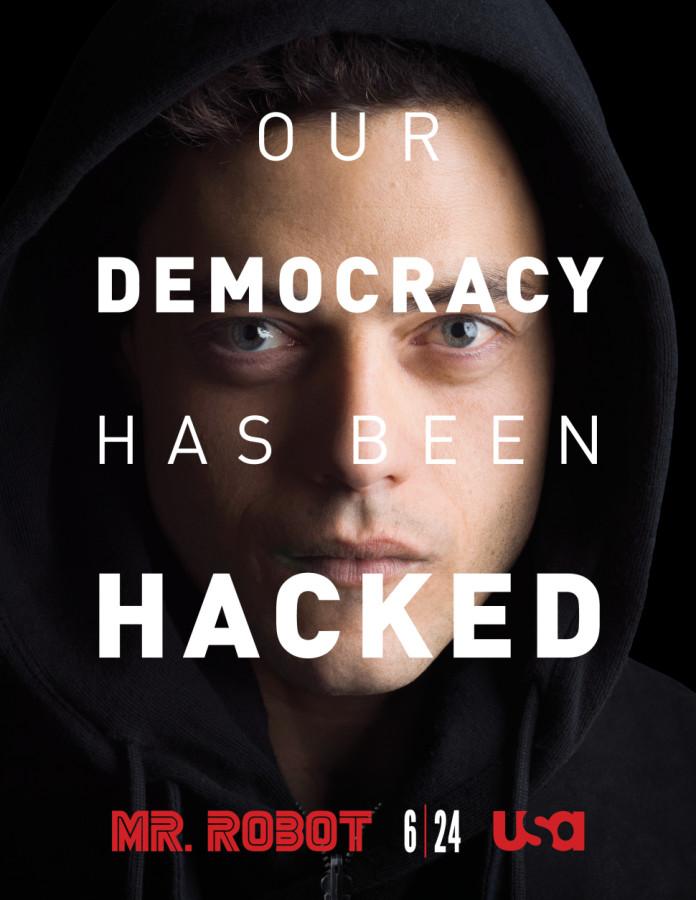We are a culture obsessed with finding and magnifying the extraordinary in the characters we watch on TV. We can see this most prominently in the sudden explosion of superheroes on the small screen in the past few years, but those are the obvious examples. If you look close enough, there are bits and pieces of those same stories sprinkled throughout the television landscape. Genres are mixing and merging, and shows are benefiting from pulling things like storytelling features, sound, lighting and camera angles from multiples genres. Yes, even from the superhero genre.
And so it’s hard not to get the feeling like you’re watching an origin story when you’re watching “Mr. Robot”, USA Network’s newest summer hit. To put it simply, “Mr. Robot” is about a computer hacker, Elliot Alderson, played by the utterly compelling Rami Malek. There have been a lot of misses in this “genre.” Other shows who have tried to capitalize on the features of the “world of computer hacking” have fallen woefully short. It’s a shame, because in this modern age, computers are both a point of intrigue as well as a complete mystery, and should be rife with storytelling possibilities. “Mr. Robot” might have unlocked the secret though, because where it comes out ahead is that it is not a show ostensibly about hacking. Rather, the benefits, downfalls and everything in between become a feature of Elliot’s character — his “power.”
With the finale just around the corner, it was pushed back because of a similarity to the recent shootings in Virginia, the debut season has so far been as exciting, emotional and full of surprising twists as you would like out of a new show.
We first meet Elliot in the monotony of his day-to-day life. By day, he’s working a simple, boring cyber security job and reasoning away his morphine addiction as “under control.” By night, he uses his “super” hacking ability to expose people’s depraved lives; his own small form of justice. Fsociety, an underground hacker group, recruits him to take down E Corp (or Evil Corp , as Elliot calls it, and as it is referred to throughout the show). We watch as he is thrust into a tangled web of underground vigilante hacking, corporate greed, murderous drug dealers — as well as his struggle with his own addiction and (probable) mental illness.
It would be a stretch to call “Mr. Robot” a superhero show. But it’s extremely interesting to watch with the idea in mind that Elliot is trying to be a hero, and to then pick out the ways the show gestures and nods to that fact. After all, we hear again and again from him how all he wants to do is “save the world,” how he has to keep his secret from Angela (Portia Doubleday), his closest friend, for fear of hurting or losing her, and we see how he interacts with Evil Corp exec Tyrell Wellick (Martin Wallström) and the other “villains” of the story. Even Elliot’s hacking, his power, is both a result of his inability or unwillingness to interact with the people around him, as well as the reason for his continual isolation. He may not put on tights and he may be deeply entrenched in a complex, dramatic mystery plot, but Elliot’s story hinges on the use of features of other genres, ultimately giving the show more richness and depth.
So then we have this fascinating dilemma where Elliot may be able to “save the world” by using his hacking skills to take down Evil Corp, but at what cost? Does he have to sacrifice his relationships with Angela and his sister Darlene (Carly Chaikin)? Does he have to sacrifice his sanity? These are questions that might not get answered in the finale, but hopefully there will be at least a hint of a way to relieve Elliot of some of his torment.
This first season takes on a lot of plot threads. It’s ambitious and impressive for a new show like this to feel so confident in its storytelling and to take so many risks. That confidence is why the season seems too tightly plotted, but there are a few times where inevitably some threads drop. The storyline with Elliot being revenge blackmailed by his girlfriend, Shayla’s (Frankie Shaw), drug supplier seemed like an attempt to pick up a slightly slogging midseason. But ultimately it didn’t tie in at all to the main plot line, except perhaps to artificially raise the stakes and show Elliot the possible consequences of his hacking. But when it was revealed that the feud was really a sibling war, and not really about Elliot at all, the whole subplot felt like a letdown.
It’s clear that “Mr. Robot” benefits from such a specific and focused perspective. Elliot is an extremely unique character, made even more compelling by Malek’s mostly monotone, but always deeply emotional portrayal. There could be an entirely different piece on why we as an audience are so enthralled by a character that is sometimes so detached from the world around him that his internal monologue completely drowns out what another character in a scene is saying to him. But the show is at its best when it focuses on Elliot and the way in which his relationships with the people closest to him are crumbling, evolving or being built back up.
“Mr. Robot” might not fit into a neat and tidy category of hacker show, superhero show, mystery or drama. But in pulling out bits and pieces of all of these genres and centering the narrative on a character as unique, unnerving and yet surprisingly relatable as Elliot, the show has really found its stride.

